Picture yourself walking through a park on a crisp autumn day, the leaves crunching beneath your feet. Suddenly, you catch a glimpse of a magnificent creature by your side – a Giant Schnauzer, exuding confidence and strength.
With their striking appearance and impressive size, these dogs are sure to turn heads wherever they go. But there's so much more to this breed than meets the eye.
From their unwavering loyalty and intelligence to their unique coat and adaptability, there's a wealth of information waiting to be discovered about Giant Schnauzers.
So, why not join us on this journey as we uncover the fascinating world of this remarkable breed?
Key Takeaways
- Giant Schnauzers are a large breed of dog originating from Germany, known for their size and weight ranging from 65 to 90 pounds.
- They are adaptable to apartment living, but their suitability should not be determined solely by their size. Factors such as energy levels and manners should also be considered.
- Giant Schnauzers are affectionate with their family, good with children, and can be protective and loyal. However, they may require socialization to get along with other pets.
- They have specific health conditions to be aware of, such as hip dysplasia and autoimmune thyroiditis. They require regular exercise, training, and proper grooming to maintain their wiry coat.
Origin and Size
The Giant Schnauzer is a large dog breed originating from Germany, known for its impressive size and distinctive appearance. These dogs typically weigh between 65 to 90 pounds. They belong to the Working Group and have a lifespan of around 12 to 15 years.
The Giant Schnauzer has a harsh and wiry outer coat with a dense, soft undercoat. They're adaptable to apartment living but size alone shouldn't be the sole determinant. Consider your neighbors' comfort and look for desirable qualities like being quiet, low-energy, and displaying good manners.
While they're affectionate with family and good with children, they may require socialization to get along with other pets. When it comes to health and care, they're generally healthy but can be prone to certain health conditions like hip dysplasia and autoimmune thyroiditis.
The Giant Schnauzer requires at least an hour of daily exercise and needs mental stimulation to prevent destructive behavior. It's important to groom their wiry coat regularly and provide proper dental hygiene and nail care.
Breed Group and Lifespan
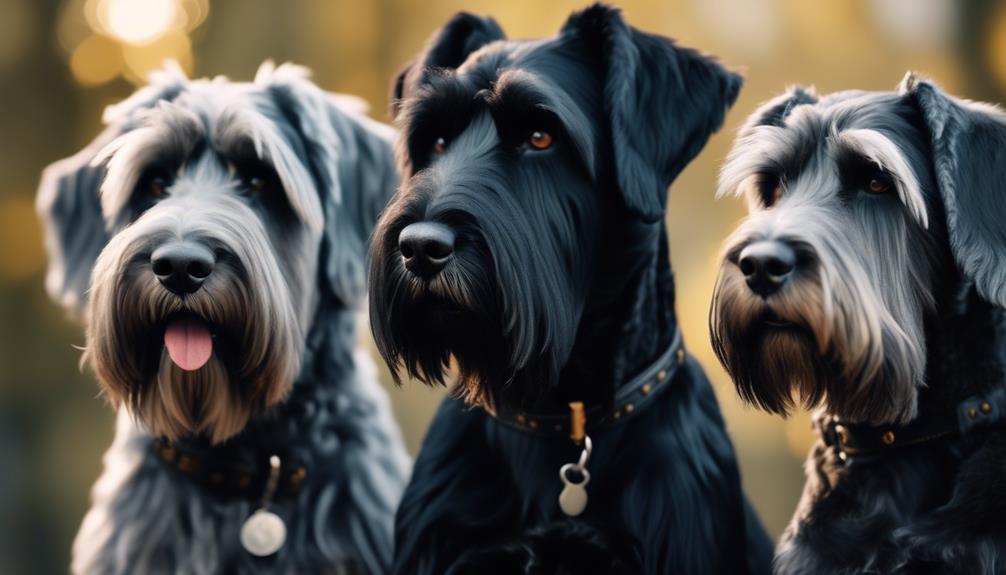
Now let's delve into the breed group and lifespan of the remarkable Giant Schnauzer. This breed belongs to the Working Group, known for their intelligence, strength, and ability to perform various tasks. They've an impressive lifespan, typically living around 12 to 15 years, which means you can enjoy their loyal companionship for a long time.
Here are four key points to consider about the breed group and lifespan of the Giant Schnauzer:
- The Giant Schnauzer belongs to the Working Group, which means they're highly trainable and excel in various working roles.
- Their lifespan of 12 to 15 years allows for many years of love and companionship.
- With their intelligence and strength, Giant Schnauzers are well-suited for tasks such as search and rescue, police work, and therapy work.
- Their working group classification also means they've a natural drive to have a purpose and be engaged, making them excellent partners for active individuals or families.
With their impressive breed group and lifespan, Giant Schnauzers are a remarkable choice for those seeking a loyal and capable companion.
Coat Characteristics
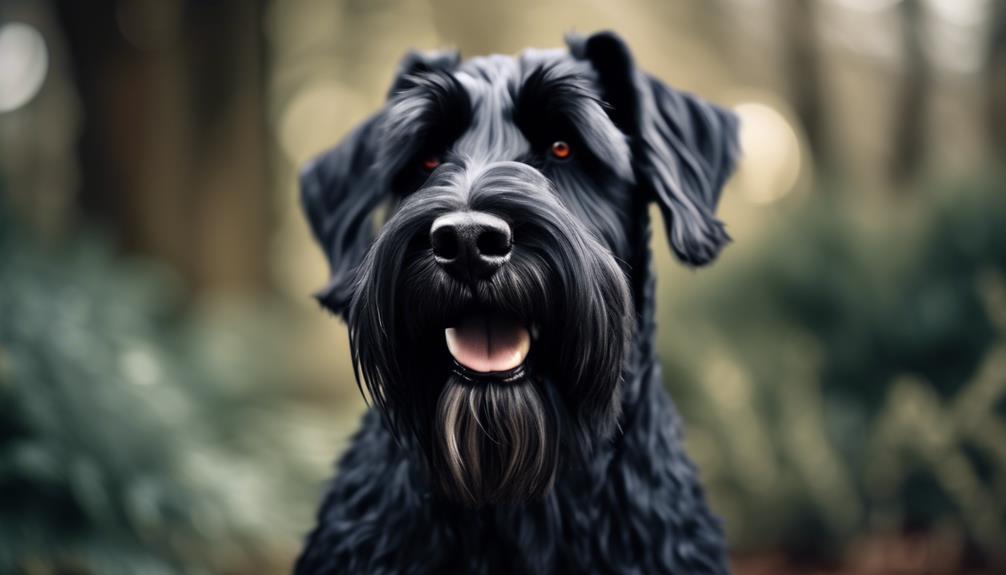
With their distinctive and rugged appearance, the Giant Schnauzer boasts a coat that's both unique and functional. Their outer coat is wiry, hard, and dense, providing excellent protection against harsh weather conditions and potential injuries. Beneath the outer coat, they've a soft undercoat that adds an extra layer of insulation.
The coat color of Giant Schnauzers can be solid black or pepper and salt, which gives them a striking and distinguished look. To maintain their coat's health and prevent mats, regular brushing is necessary.
While the Giant Schnauzer's coat requires some maintenance, it's well worth the effort for the stylish and practical benefits it provides.
Adaptability to Living Conditions
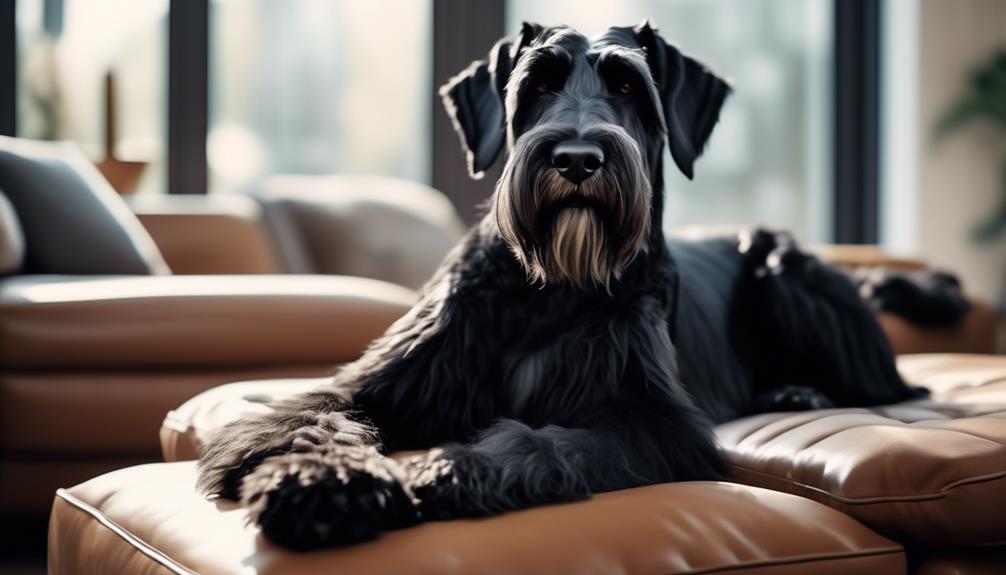
Moving on to the topic of adaptability to living conditions, you'll find that the Giant Schnauzer is a breed that can easily adjust to various environments and is well-suited for different living situations. Here are some key points to consider:
- They adapt well to apartment living, but size isn't the only factor to consider.
- It's important to think about your neighbors' comfort when selecting a dog.
- Desirable qualities in an apartment dog include being quiet, low-energy, and displaying good manners.
- Small dogs with high energy levels may not be suitable for apartment living.
With these qualities in mind, the Giant Schnauzer can be a great companion in various living conditions. Whether you live in a small apartment or a larger house, this adaptable breed can thrive and make a wonderful addition to your family.
Temperament and Socialization
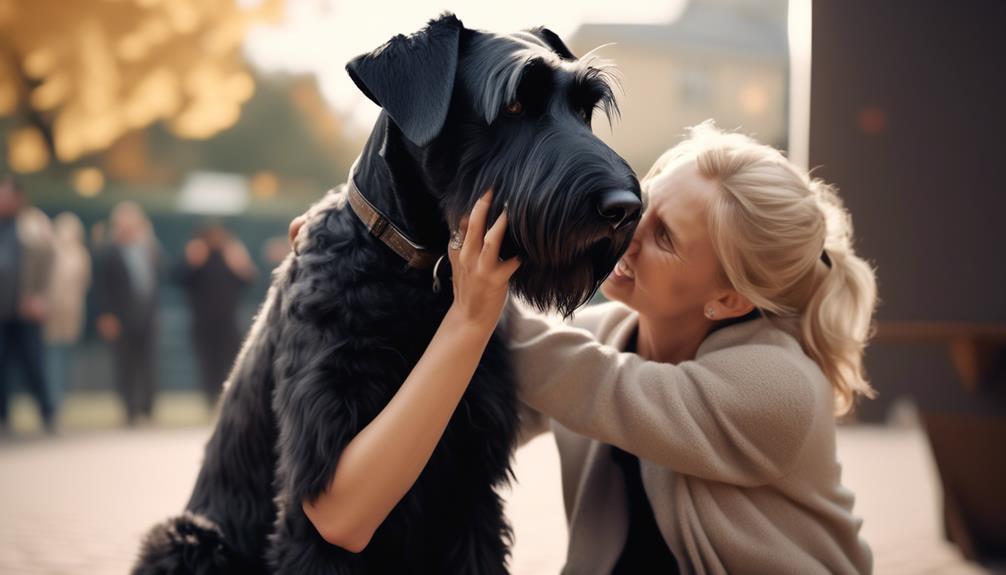
The temperament and socialization of the Giant Schnauzer are crucial aspects to consider when choosing this breed as a companion. Giant Schnauzers are known to be affectionate with their families and good with children. They can also be protective and loyal, making them excellent watchdogs. However, they may require socialization to get along with other pets. Temperament can vary, so early training and socialization are important. To give you a better understanding of the Giant Schnauzer's temperament, here is a table highlighting their key characteristics:
| Temperament | Description |
|---|---|
| Affectionate | Giant Schnauzers are loving and devoted to their families. |
| Good with children | They are generally patient and gentle with children. |
| Protective and loyal | Giant Schnauzers have a strong protective instinct and are fiercely loyal to their loved ones. |
| May require socialization | Some Giant Schnauzers may need proper socialization to get along with other pets. |
| Temperament can vary | The temperament of Giant Schnauzers can vary from dog to dog, so early training and socialization are important. |
Understanding the temperament and socialization needs of the Giant Schnauzer will help you determine if this breed is the right fit for you and your family.
Common Health Conditions
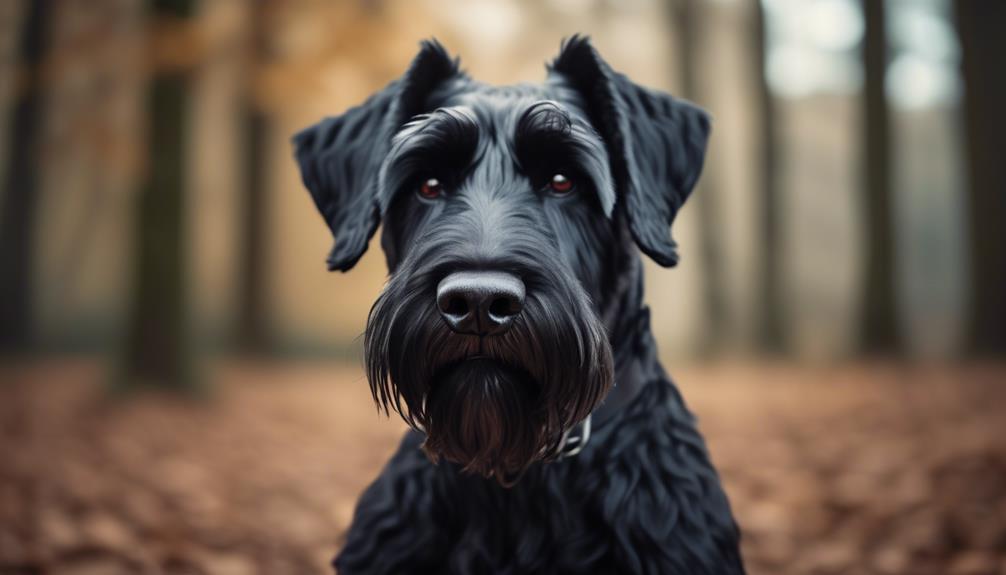
What are the common health conditions that Giant Schnauzers are prone to? Here are a few that you should be aware of:
- Hip Dysplasia: This is a genetic condition where the hip joint doesn't develop properly, leading to pain and mobility issues.
- Osteochondrosis Dissecans (OCD): This is a joint disorder that affects the cartilage and bone development, causing lameness and discomfort.
- Autoimmune Thyroiditis: This is an autoimmune disease that affects the thyroid gland, resulting in hormonal imbalances and potential complications.
- Squamous Cell Carcinoma: This is a type of skin cancer that can affect Giant Schnauzers, usually appearing as sores or growths on the skin.
As a responsible owner, it's important to be aware of these conditions and take preventive measures. Regular exercise, a balanced diet, and routine veterinary check-ups can help maintain your Giant Schnauzer's overall health and well-being.
Care and Exercise Requirements
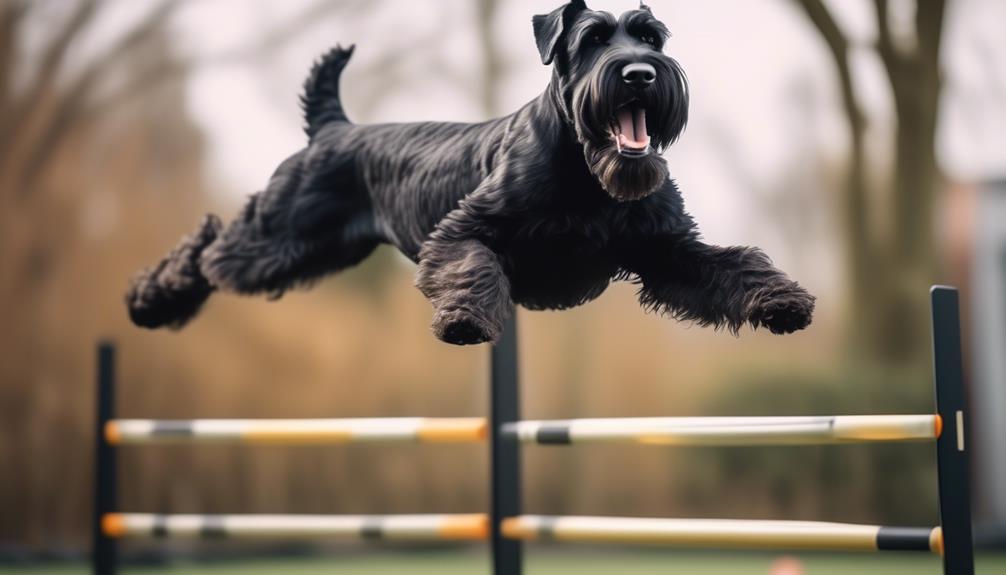
To properly care for a Giant Schnauzer and meet their exercise requirements, it's important to establish a routine that includes regular physical activity and mental stimulation.
Giant Schnauzers are a large breed and need plenty of exercise to keep them happy and healthy. They require at least an hour of daily exercise, which can include activities such as brisk walks, jogging, or playing fetch.
Mental stimulation is also important for this intelligent breed, so consider providing puzzle toys or engaging in obedience training sessions. Additionally, Giant Schnauzers thrive when they have a job to do, so giving them tasks or constructive activities can help prevent destructive behavior.
Remember to always train with firmness and consistency, avoiding physical force or harsh words. Regular grooming, including brushing their wiry coat, is also necessary to prevent mats and keep their coat looking its best.
Coat Color, Grooming, and Interactions With Others
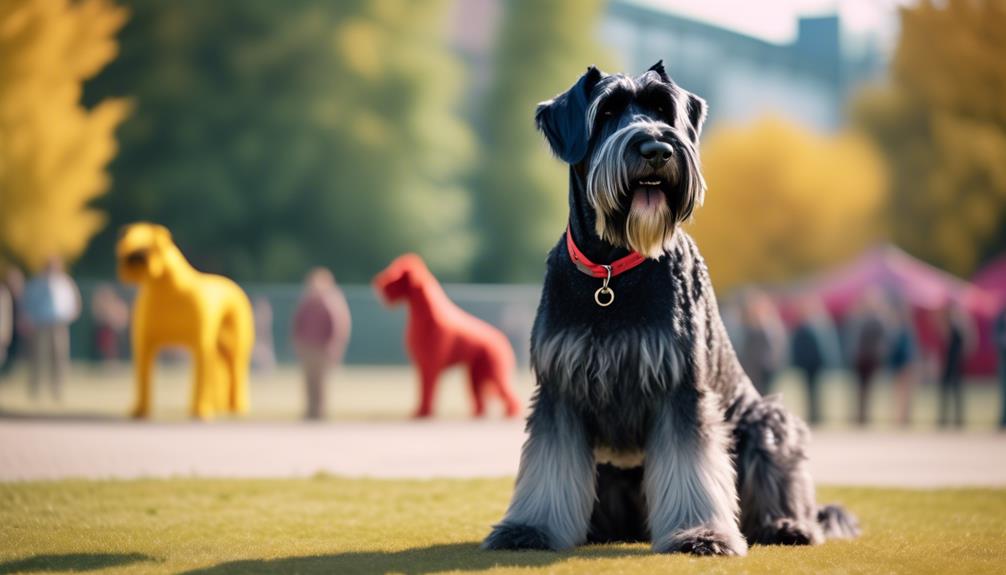
When it comes to Giant Schnauzers, their coat color, grooming needs, and interactions with others are important aspects to consider.
The Giant Schnauzer has a distinct coat that's wiry, hard, and dense, with a soft undercoat. Their coat color can be solid black or pepper and salt.
Regular brushing is necessary to prevent mats and maintain the coat's appearance.
In terms of interactions with others, Giant Schnauzers may not get along well with other dogs, especially those of the same sex. They shouldn't be left unsupervised with cats.
Additionally, they aren't recommended for homes with young children and supervision is necessary when dogs and young children interact.
It's important to be mindful of these factors when considering a Giant Schnauzer as a pet.
Frequently Asked Questions
Are Giant Schnauzers Good Guard Dogs?
Yes, Giant Schnauzers are good guard dogs. They are protective and loyal, making them excellent at guarding their family and property. Their size and temperament make them highly effective in this role.
How Much Exercise Does a Giant Schnauzer Need?
You'll need to give your Giant Schnauzer plenty of exercise to keep them happy and healthy. Aim for at least an hour of daily physical activity, and provide mental stimulation too.
Do Giant Schnauzers Shed a Lot?
Yes, Giant Schnauzers do shed a moderate amount. They have a wiry outer coat with a soft undercoat. Regular brushing is necessary to prevent mats and keep their coat healthy.
Can Giant Schnauzers Be Left Alone for Long Periods of Time?
Yes, they can be left alone for moderate periods of time, but it's important to provide them with mental and physical stimulation. Consider interactive toys or a dog walker to prevent boredom and anxiety.
Are Giant Schnauzers Good With Other Pets?
Yes, they can be good with other pets. Giant Schnauzers are generally affectionate with family and may require socialization to get along with other pets. Early training and socialization are important.
What are the characteristics and traits of a Giant Schnauzer that may be present in a German Shepherd Rottweiler mix?
The German Shepherd Rottweiler mix characteristics can manifest in a variety of ways in a Giant Schnauzer. Some common traits include loyalty, intelligence, and a strong protective instinct. These dogs may also exhibit a high energy level, a confident demeanor, and a knack for learning and obedience training.
Conclusion
In conclusion, the Giant Schnauzer is a remarkable breed that offers both strength and loyalty as a companion.
With their impressive size and striking appearance, they're sure to turn heads wherever they go.
Their adaptability to various living conditions and their friendly temperament make them a great choice for families.
However, it's important to note their grooming needs and potential health conditions.
Overall, the Giant Schnauzer is a captivating breed that will bring joy and companionship to any home.




